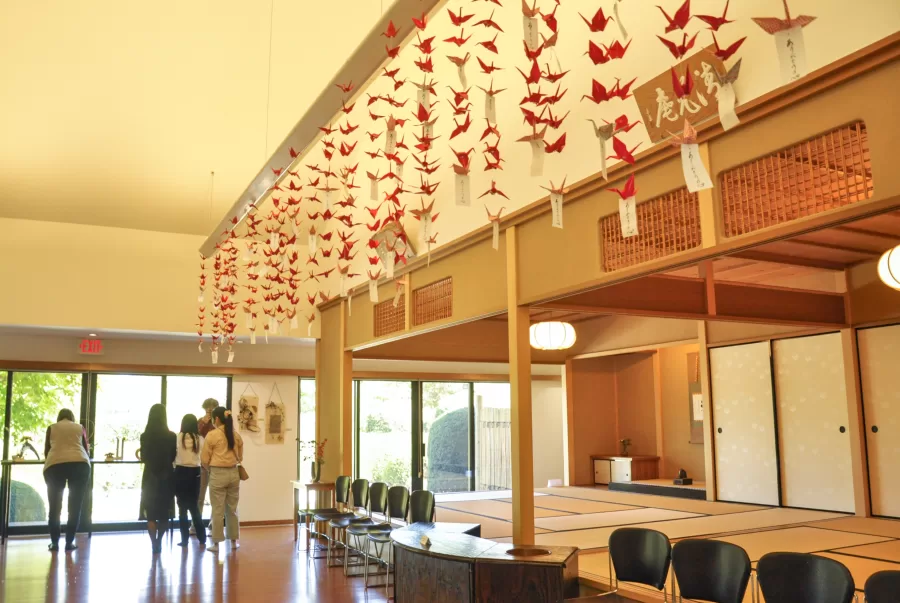Japan House plans for expanded facility, courses following $3.3 million donation
Origami swans, created by students of ARTJ 199, hang on the ceilings of the Japan House on Oct. 8. The Japan House recently receives a $3.3 million donation from the Ogura-Sato family.
Dec 7, 2022
Following a $3.3 million donation from the Ogura-Sato family to Japan House, the new Ogura-Sato Annex will bring expansions to the facility, courses and gardens.
Dr. George Ogura, a devoted supporter of the facility, initially donated $1 million in 2017, but passed away before construction began.
Professor Emeritus Shozo Sato, founder of Japan House, and his wife Alice Sato, who is Ogura’s Sister, contributed another $1 million.
The project was made a reality when Nick Offerman, an actor, comedian and alumni known for his work on “Parks and Recreation” — who enrolled in classes taught by professor Sato — donated all his proceeds from his two recent performances.
In honor of the donations, the new facility will be named the Ogura-Sato Annex. The facility will provide space for vast inclusion during tea ceremonies and offices as well as the opportunity for larger class sizes.
Get The Daily Illini in your inbox!
The Annex will also feature improved accessibility for students and visitors with physical disabilities, providing a space for everyone.
According to Michael Darin, education experience coordinator, the principles of Japan House were born five hundred years ago from the book, “Tea Life, Tea Mind,” a book Japan House uses to this day.
Chadō, the Japanese way of tea, is a course offered at Japan House that highlights various aspects and the importance of Japanese culture.
The values of Japan House — harmony, respect, purity and tranquility — come from the practice and history of Chadō, Darin added.
According to Diana Liao, education associate of Japan House, each principle births the next and one cannot function without the other.
Darin says that harmony means having unity between the environment and each other, allowing an understanding and appreciation of each other’s role and presence.
“If you have harmony, you can have respect,” Darin added
Darin further explained that harmony empowers the respect of the culture. He said that when respect and harmony are in sync, purity can form.
“Purity is coming with an open mind and open heart to situations and emotions,” Darin said. “Humans experience emotions every day, some days more intense than others.”
At Japan House, the understanding of tense emotions allows people to put them to the side and open space for purity, Liao added.
According to Darin, if emotions are practiced in pure states, peace can emerge. If all three principles are aligned, life will feel more full, exciting and ultimately tranquil.
Darin added that the gardens are a “reflection of the principles,” and recommended that anyone interested should visit them.
Liao, who was once a student at Japan House but has now established herself as an education associate within the facility, explained a notion practiced during Chadō called “Muhinshu.”
“No guests, no hosts, no boundaries, no difference,” Liao said.
The University’s record enrollment for the 2022–2023 school year has also had an impact on Japan House courses and the advancement of the facility.
In the course catalog, Art J, a category for students to see all the courses offered by Japan House, was added due to the addition of online classes.
Some classes offered are calligraphy, Japanese aesthetics, animation, manga and Chadō.
“Japan House hopes to expand class sizes and host events such as Bazar and Matsuri that were put on hold due to COVID-19,” Liao said.
Bazar is a sales event in Japan House’s main room where the community can purchase various donated and antique Japanese items.
Matsuri is a festival that unites the community with culture, food, cosplay, clothing, performances and more.
According to Darin, Japan House has not had an expansion in over 25 years.
“What I’m most excited about is to engage the public, even just being in the gardens allows you to feel our principles and become curious about the culture,” Darin said. “This expansion will bring awareness and opportunity.”






